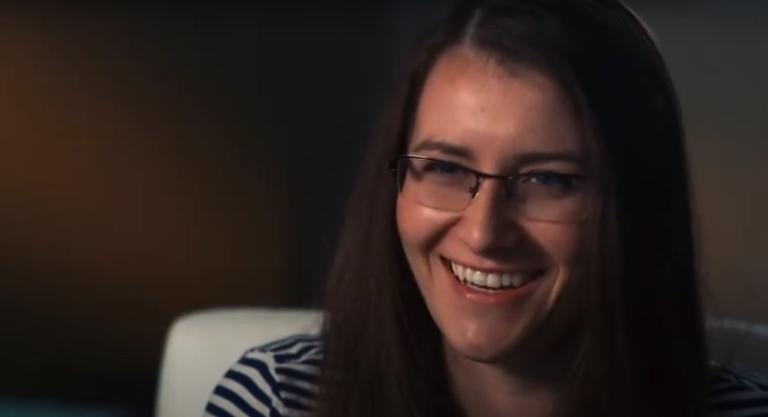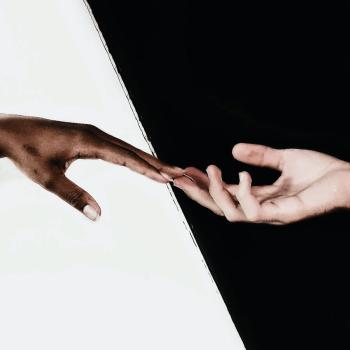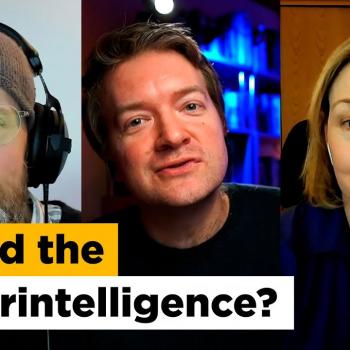
Jordan Monge was a devout atheist from a young age. Jana Harmon, whose PhD research is in adult conversion, tells Jordan’s story of discovering faith through both an intellectual and experiential encounter.
Jordan strongly identified with atheism from her earliest memories, declaring her disbelief in God at the age of 6. Born in the home of atheistic parents, her father a university philosophy professor, she readily dismissed Christianity as a man-made, irrelevant, irrational, antiquated superstition. An ivy-league educated student who was highly certain of her own belief, she had not found any Christians who could rise to her intellectual challenges.
Jordan’s parents wanted her to decide for herself what to believe about God. After her great-grandfather died, she prayed to God that he would not let anyone else in her family die. But eventually, she realized that “God isn’t that powerful after all.” This realization was the “sparking moment” when she moved towards agnosticism.

Unhelpful Christians
As a child, Jordan attended her father’s philosophy classes where she listened to both sides of the arguments and became a convinced atheist. Confident in her view of reality, she readily challenged her Christian friends on their beliefs but found they were short on answers. One particular contentious exchange marked “the turning point” towards complete alienation from religious believers. She recalled:
“Christian kids would tell me: ‘just because the Bible says so.’ Then I would ask: ‘How do you know that what the Bible says is true?’ It really felt like people believed this because they were born into it. When I was in high school, I brought a Bible to school with post it notes where the contradictions were. I would ask my friends: ‘How do you make sense of this?’ They didn’t know how to respond.
“A boy who was an evangelical Christian kept arguing with me every day and other kids would hear our argument. One day, a bunch of them surrounded me and asked: ‘Why are you an atheist? Why aren’t you a Christian?’ One boy said: ‘I am going to come to your house and shoot all of the atheists.’ That was the first time I felt alienated by Christians, afraid of this whole religion business. That’s when I thought, ‘I’m an atheist and this is how the world should be. You shouldn’t force your religion on to me.’ That was probably the turning point.”

The Stone Paradox
An out-spoken atheist, Jordan called into a nationally syndicated radio show to defend her position against the phrase ‘under God’ in the Pledge of Allegiance. The show host asked her why she didn’t believe in God. She gave him her “best argument for atheism”:
“If God was omnipotent, then he should be able to create anything. If God is omnipotent then he should be able to lift or carry anything. He should not be able to create a rock that he cannot lift. The paradox of the stone.”
Armed with philosophical arguments against God, no one seemed to be able to adequately answer Jordan’s objections. Atheism seemed like the logical, rational thing for her to believe, especially in the face of inadequate substance on the other side.
Intellectual Questions
However, Jordan unexpectedly met intelligent Christians at Harvard who substantively challenged her positions. Their discussions caused her to reconsider the strength of her beliefs, especially naturalism’s lack of grounding for objective morality. A self-proclaimed “conservative atheist,” she “strongly believed in objective morality” and began searching for a way to support her view.
Jordan approached her father with her dilemma, but he refused to give her a direct answer, instead recommending books by Ayn Rand. While Rand’s writing style was beautiful and imaginative, Jordan found her philosophy lacking: “Like a castle built upon a cloud. There was nothing supporting it.”
There seemed to be no way to reconcile naturalistic atheism with her strong belief in objective morality. Was nihilism her only choice?Jordan desperately wanted to resolve this cognitive dissonance. She asked herself: “How do I make sense of the world?”
“I went and sat on the bank of the river and thought if nihilism is true, why don’t I just end it. I wasn’t depressed. I did not want to end my life. I just thought, if this is really true then these two moral choices are equivalent. I would have no good reason not to do it. I thought, well maybe I can write a letter explaining there is no objective reality so this choice is an equal choice. But by writing a letter, you are affirming there is value and truth, so, that doesn’t make sense.
“Then I thought of the other problem with that choice. The other choice completely cuts off your options. So, I decided I’m not doing this. I am going to have to think about this more.”

Moral Questions
Seeking answers, Jordan asked a former teacher about moral grounding. He told her that morality was formulated either through a transcendent source (God) or through societal consensus, but Jordan could not accept either option:
“I don’t think you can get objective morality from God because he doesn’t exist. And you can’t get it from consensus because that changes.”
After more intellectual wrestling, she had an “epiphany”:
“It was very clear that to kill me was wrong. What I am as a human being – all of my thoughts, emotions and capabilities – is good and that it is bad to destroy it. Then, I was talking with my friend and it hit me. He is just as awesome as I am. He has got all of these thoughts and emotions.
“There was a very strong sensation of being overwhelmed with how awesome human beings are and how wrong it would be to harm one, and how large the world seemed. I was overwhelmed with the whole experience. After that I knew it was wrong to kill another person, even if I may not be able to tell you why.”

Crumbling Atheism
Jordan knew she could not ground her felt sense of human value in atheism. For within naturalism, human beings are viewed in a reductionistic way as nothing but matter in motion with no inherent value or dignity. Yet, she intuitively knew she was more than that, others were more than that.
In naturalism, right and wrong are nothing but individual or societal preference, subject to the winds of change. Yet, she intuitively knew that a real right and wrong did exist, that it was inherently wrong to harm others. Her views were becoming clearer.
Around that time, Jordan began debating her university friends on the origin and fine-tuning of the universe, the possibility of miracles, the reliability and truth of the Bible, and the historical evidence for the resurrection and found the evidence for God compelling.
On her search, she even found logical resolution to her paradox of the stone. After all, if she was going to believe in Christianity, it had to be well grounded compared to other worldviews. Reflecting, she said:
“There were definitely strong arguments that I had and what it really took for me to become a Christian was for those arguments to be dismantled and for me to find arguments for the other side.”
Belief could not be a matter of blind faith. She said:
“I don’t think I could believe something unless I thought it was true. I had to evaluate each thing, each step in the process. I looked at both sides and argued with my dad. I read Richard Dawkins and said: ‘OK Richard Dawkins, wow me.’ And I was so disappointed in him. I was so depressed. I thought, ‘This is what other atheists think? What’s wrong with them?’ I tried my best to be objective, to look at both sides, to read both sides.”
A Change of Heart
As the intellectual component of Christianity was becoming more and more compelling, Jordan decided to attend church “to figure it all out”. She began reading the Bible and the accounts of the crucifixion and felt emotionally unmoved. Feeling confused, she prayed:
“God, my head thinks it is true, but my heart is totally not in it. What is wrong with this? What is wrong with me?”

Then, Jordan’s heart began to change when she looked at Christianity through a more personal lens:
“I started feeling the weight of my sin very strongly, that I was not living up to my ideals. I saw a beauty in Christianity that I had never seen before. I had seen Christ on the cross thousands of times but I did not really know what it meant. But someone explained it to me: ‘This is a sign of God dying for you.’
“Then I thought, ‘This is love. This is beauty.’ Then I remembered my high school teacher telling me: ‘Love is sacrifice.’ That’s when I realized, ‘He is right. Sacrifice is love.’ It clicked. I found out that at its root, Christianity is about love.”
Altogether, the intellectual, moral, experiential and personal truth of Christianity convinced Jordan to become a follower of Christ. Questions that had haunted her as an atheist found resolution in the fullness of the Christian worldview for which she became an active advocate – a place very far from her days as an outspoken atheist.
You can hear more of Jordan’s story on the SIDE B Podcast with Jana Harmon
You can hear more from Jana Harmon on Unbelievable
Subscribe to the Unbelievable? podcast
Join NT Wright, Tom Holland, Josh McDowell and others online at the Unbelievable? conference on 15th May












